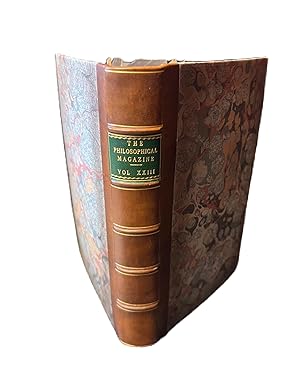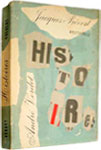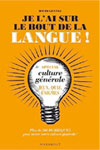"On the calorific effects of magneto-electricity, and on the mechanical value of heat," in: London, Edinburgh and Dublin Philosophical Magazine and Journal of Science.
JOULE, James Prescott (1818-1889). **Mechanical Equivalent of Heat // Heat is a Form of Energy**
Vendeur
JF Ptak Science Books, Hendersonville, NC, Etats-Unis
Évaluation du vendeur 5 sur 5 étoiles
![]()
Vendeur AbeBooks depuis 28 juin 2016
A propos de cet article
Description :
**Mechanical Equivalent of Heat // Heat is a Form of Energy** JOULE, James Prescott (1818-1889). "On the calorific effects of magneto-electricity, and on the mechanical value of heat," in: London, Edinburgh and Dublin Philosophical Magazine and Journal of Science, 3rd series, 1843, volume 23. 215mm, viii, 552pp in the full volume, with the Joule papers on pp. 263-276, 347-355, and 435-455 (complete). Beautifully rebound in calf-backed marbled boards, with raised bands, and a spine label with a typeface very close to the original. The boards have been slightly antiqued to give the whole production the sense of being in the original binding. Superior workmanship. [++] At the end of the third and final paper, we find the following, in a "P.S." to the paper: "We shall be obliged, after all, to admit that Count Rumford was right in attributing the heat evolved by boring cannon to friction, and not (in any considerable degree) to any change in the capacity of the metal. I have myself proved experimentally that heat is forced by the passage of water through narrow tubes. My apparatus consisted of a piston perforated by a number of small holes, working in a cylindrical glass jar containing about 7 lbs. of water. I thus obtained one degree of heat per lb. of water from a mechanical force capable of raising about 770 lbs. to the height of one foot, a result which will be allowed to be very strongly confirmatory of our previous deductions. I shall lose no time in repeating and extending these experiments, being satisfied that the grand agents of nature are, by the Creator's fiat, indestructible', and that wherever mechanical force is expended, an exact equivalent of heat is always obtained."--JP Joule, 1843, p 442 of the volume offered here. [++] See: "Experimental proof of the mechanical equivalent of heat for physical phenomena" (Printing and the Mind of Man p. 196); Dibner, Heralds of Science 158. [++] ".Joule made a systematic study of all the thermal effects accompanying the production and passage of the current in a voltaic circuit. From this study, completed by January 1843, he obtained a clear conception of an equivalence between each type of heat production and a corresponding chemical transformation or resistance to the passage of the current. Regarding the nature of heat, no conclusion could be derived from the phenomena of the voltaic circuit: voltaic electricity was a grand agent for carrying, arranging and converting chemical heat ; but this heat could either be some substance simply displaced and redistributed by the current, or arise from modifications of atomic motions inseparable from the flow of the current. Joule saw the possibility of settling this last question and at the same time of subjecting the equivalence idea to a crucial test by extending the investigation to currents not produced by chemical change but induced by direct mechanical effect. This brilliant inference led him to the next set of experiments, among the most extraordinary ever conceived in physics. He enclosed the revolving armature of an electromagnetic engine in a cylindrical container filled with a known amount of water and rotated the whole apparatus during a given time between the poles of the fixed electromagnet, ascertaining the small change of temperature of the water; the heat produced in this way could only be dynamical in origin. Moreover, by studying the heating effects of the induced current, to which a voltaic one was added or subtracted, he established, by a remarkably rigorous argument, the strict equivalence of the heat produced on revolving the coil and the mechanical work spent in the operation. He thus obtained a first determination of the coefficient of equivalence (1843)."--Complete DSB online [++] "James Joule.[in this paper] publishes his first demonstration of the mechanical equivalent of heat."--Parkinson, Breakthroughs, p. 320. N° de réf. du vendeur ABE-1670781768806
Détails bibliographiques
Titre : "On the calorific effects of ...
Éditeur : London, Richard and John Taylor
Date d'édition : 1843
Reliure : Hardcover
Etat : Fine
AbeBooks vous offre des millions de livres anciens, neufs, d'occasion et épuisés proposés par des milliers de vendeurs du monde entier. Acheter sur AbeBooks est simple, sûr et 100% sécurisé - effectuez votre recherche, passez commande sur notre site sécurisé et recevez votre ouvrage directement expédié par le vendeur.
Cherchez parmi des millions de livres proposés par des milliers de vendeurs
Livres anciens et de collection
Livres rares, manuscrits, incunables ou livres signés, découvrez notre page consacrée aux livres anciens et de collection.
Editions originales
Tirages limités, éditions spéciales ou numérotées, retrouvez notre sélection d'éditions originales.
Livres d'occasion
Meilleures ventes, idées lecture et lauréats à prix réduits, faites des économies grâce à nos bonnes affaires et à la livraison gratuite.




